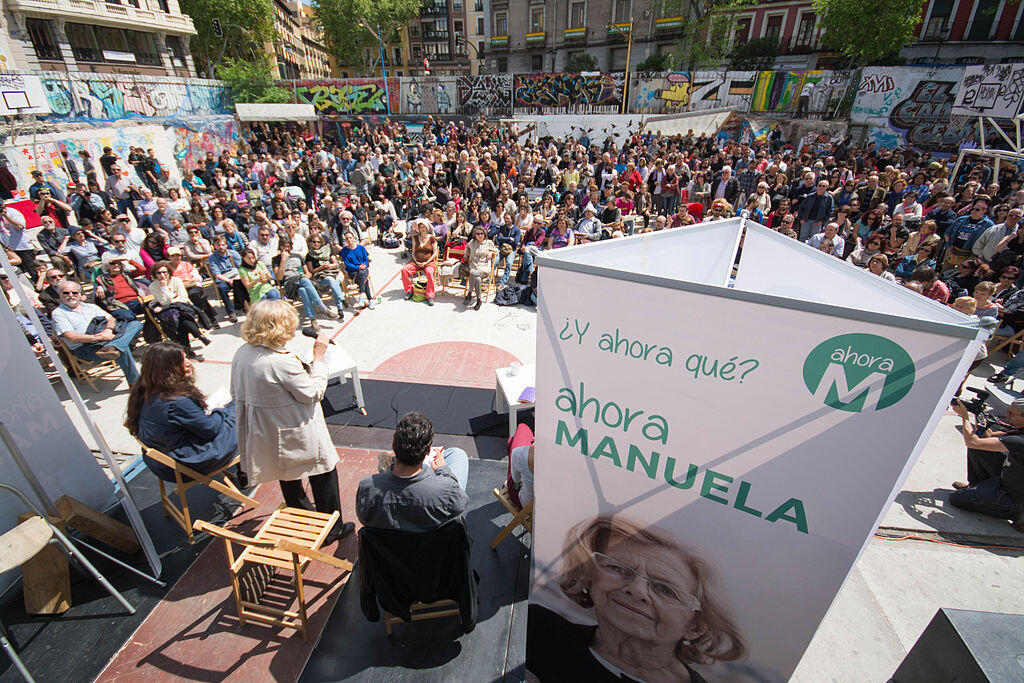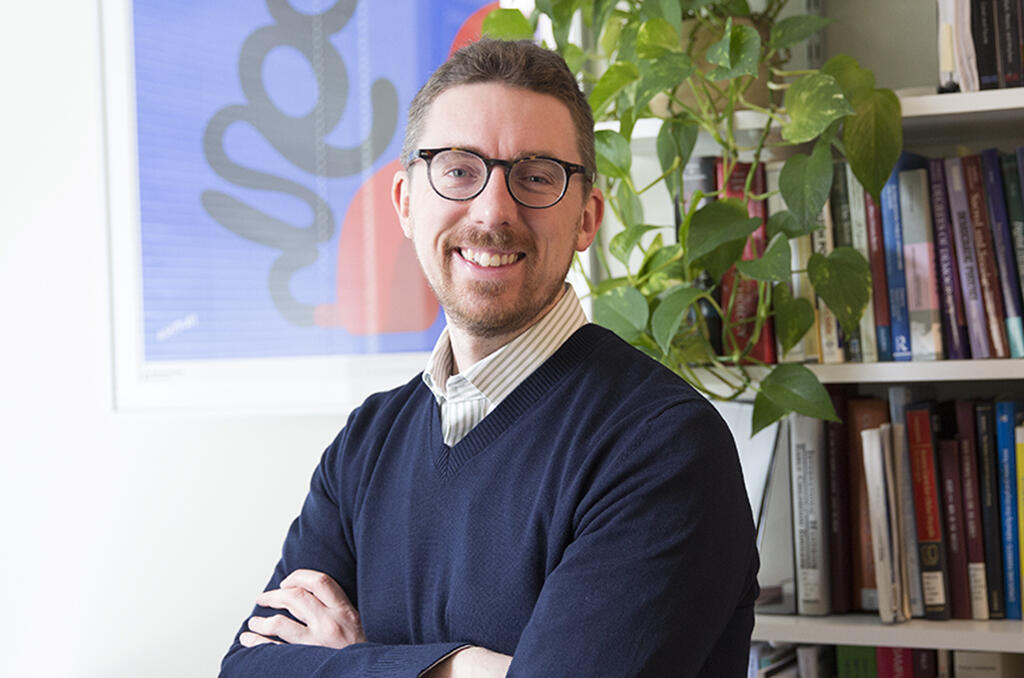Quinton Mayne on How Ahora Madrid Realized an Agenda of Democratic Disruption
The Ash Center sat down with Quinton Mayne, Ford Foundation Associate Professor of Public Policy, to discuss how a progressive electoral alliance reimagined the relationship between citizens and city hall
Earlier this academic year, the Ash Center published a case study examining the rise of Ahora Madrid, a progressive electoral alliance that—to the surprise of onlookers—managed to gain political control, just a few months after being formed, of the Spanish capital following the 2015 municipal elections. In Disrupting the Party: A Case Study of Ahora Madrid and Its Participatory Innovations, Quinton Mayne, Ford Foundation Associate Professor of Public Policy at HKS and Cecilia Nicolini, a research fellow at the Ash Center describe how Ahora Madrid won voters over with a bold agenda that reimagined the relationship between citizens and city hall.
Mayne and Nicolini’s analysis is a case study of this innovation agenda. The paper begins by exploring how Ahora Madrid’s agenda emerged as a response to, and built off of, historic levels of political disaffection and mass mobilization spurred by the 2008–2014 Spanish financial crisis. The authors examine how the alliance’s agenda of democratic disruption was realized, first through an unusual bottom-up electoral campaign and then, after taking office, by challenging and rethinking established relations between public officials, civil society, and city residents.
We sat down with Mayne to discuss how Ahora Madrid came to power, its radical agenda of democratic disruption, and how the movement ended up shaping the political culture in Madrid.
Ash: Why did you and Cecilia Nicolini choose Ahora Madrid as the subject of your case study?
Mayne: The suffering and dislocations of the Great Recession unleashed a tremendous progressive potential, and you see that on the national level in many countries such as with Bernie Sanders in the U.S. or Jeremy Corbyn in the UK. As a result, many cities became the sites of large-scale mobilizing and organizing through mass marches and demonstrations, but city halls also become the political target of this progressive action. When we started working on the case these local developments weren’t receiving as much attention as the national-level stories. And Madrid is one of very few cases where there was an electoral breakthrough that led to a shift in the administration.

How did Ahora Madrid manage to ultimately win power?
Crises, like the Great Recession, or COVID if using a more contemporary example, often reveal enduring underlying inequities that have gone unaddressed or minimally addressed. What’s more, they provide an opportunity for political entrepreneurs and challengers to use the heightened salience of these inequities to generate a mobilizing energy, even sometimes an organizing energy. Both of which are then directed at reforming the system.
But then the big question is what comes of that? Does movement strength result in electoral gains in the near term? And if so, do these gains translate into changes at the periphery, or can enough political power be exerted at the ballot box that means progressive challengers can get to the heart of the problem? More often than not, the answer is no, it doesn’t and it can’t. At least not in the short term.
Often the story is that parties or candidates win a few seats, then they try to expand their appeal and win more and more. What’s unique about Ahora Madrid, and we tried to get that across in the case, almost to their own surprise they won bigger than they thought they would. I think they probably thought they would win a few seats – enough to gain some influence, and use that to achieve some success in some policy areas. Instead, they won enough seats to lead the new administration, ending 24 years of rule by Spain’s main center-right party.
Is a movement that comes into power through a voter backlash sustainable?
If you look at the Biden-Harris campaign, there was a huge amount of progressive energy that was part of the equation to their victory. There are lots of other forces at work as well, like an anti-Trump vote rather than a pro-progressive vote. But what happens to that energy after the votes are counted and when the realities and complications of governing set in?
Ahora Madrid is a really interesting case to think through this issue of sustainability. On the one hand, half-way through her term in office, the city’s Mayor, Manuela Carmena, was being openly criticized by more radical councilors elected on the same ticket, and these internal challenges received a lot of press coverage. Similarly, the fact that Ahora Madrid had to reinvent itself as Más Madrid and failed to retain power following the 2019 municipal election could also be viewed as signs of unsustainability. But I think that would be wrong.
In 2019, Más Madrid actually received the largest share of votes and lost just one seat. By contrast, the PP (the main center-right party) lost 6 seats. Still, overall Más Madrid and PSOE (historically the main party of the left) were two seats short of a majority. While they didn’t secure a second term, for me this outcome shows they managed to hold their coalition together. It also reminds us though that sustainability is just one of the major obstacles that progressive challenger movements face. Expanding their base and allies to take in a majority of voters is the other. And with the rise of radical and populist right challengers, this is especially difficult. Forces and conditions that fuel disaffection can lead voters to opt for the radical left as well as the radical right. In the 2019 Madrid election, for example, Spain’s far-right party Vox picked up four seats, and through a confidence-and-supply arrangement, this allowed a right-led minority government to regain power.

What were some of Ahora Madrid’s lasting policy legacies, and how true did they live up to their campaign promise of participatory government?
It’s not uncommon to find parties running for office with a broad commitment to being participatory. Sometimes this is rhetoric, but often it goes untested because they’re unable to win enough seats to make their program a reality. When Ahora Madrid launched, given their emergence from the grassroots activism of the anti-austerity Indignados movement, their commitment to a disruptively more participatory approach to governing felt organic and authentic. That said, at the time it also didn’t seem like they could imagine that just four months later, they’d be running the city.
When they did come to power, it was the level of their commitment to participatory governing, and through initiatives such as a €100-million participatory budgeting process, which became a hallmark of their time running Madrid. Certainly, their approach to participatory democracy reflected some naivete at the start, but there was also evidence of important course direction for advocates of participatory democracy.
An important diagnosis is that there aren’t enough opportunities for citizens to participate. Many people will also say they want to make their voices heard. But sustaining citizen participation on a grand scale between elections is difficult. Creating spaces for citizen engagement, even an award-winning digital platform like Ahora Madrid did, doesn’t result in a cultural shift in how people think about politics and participation. That requires organizations and relationship-building driven by a network of socially accountable civic leaders. These are exactly the kinds of things Ahora Madrid shifted to supporting over time, while their participatory budgeting process went from strength to strength. And had they won a second term, I believe they’d have directed even more resources in building civic capacity. While the new administration has dismantled most of the formal spaces for citizen engagement created by Ahora Madrid, including participatory budgeting, I believe Ahora Madrid has played an important role in helping to move the city’s political culture in a more participatory direction over the medium and long term.